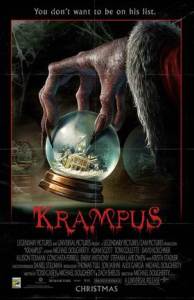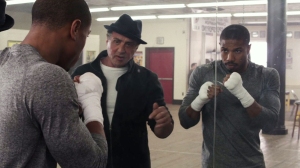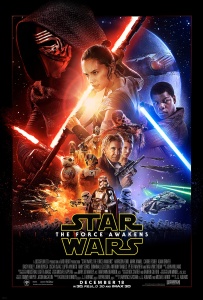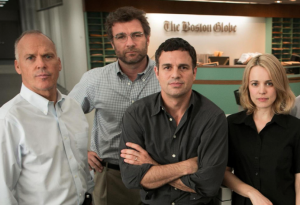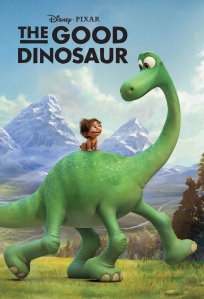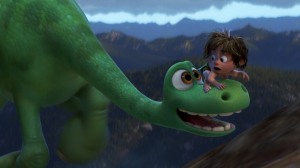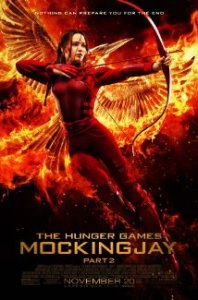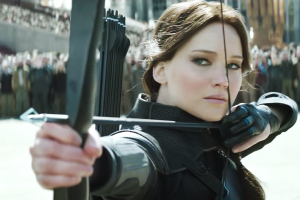
One of the biggest surprises I have experienced since I started this blog and catalog of thoughts on film, television, etc., is not one you would expect.
Of all the reviews, countdowns, editorials and ramblings I’ve posted in the last few years, the one that has had the most longevity and some of the most views is not my revelation on Godzilla, or my favorite films countdown or even some of my early reviews. It is the countdown of my 10 favorite episodes of "My Little Pony: Friendship Is Magic."
I post my reviews and editorials on multiple sites, and on one of them (World Of Entertainment) that particular countdown is in the top ten in terms of viewing in 2014 (though the highest viewed article from that year was my fan reaction to Gareth Edward’s "Godzilla"). But more surprising is that it is the most viewed article on the entire site for 2015.
I am beyond words. I knew there were bronies and pegasisters all over the internet, but damn.
Well, if that’s case, why not do another one? There has been a whole new season of "My Little Pony: Friendship Is Magic" since the last article I published on the topic, and well over 30 new episodes.
As such, I will be counting down my top ten favorite episodes of "My Little Pony: Friendship Is Magic" since my last countdown. Like the previous one, these are the episodes that have stuck with me the longest after watching them. The ones that I felt best personified this creative, funny and thought-provoking show made for both children and adults.
For those MLP fans out there, this will include every episode between "For Whom the Sweetie Belle Toils" and the end of season five, "The Cutie Re-Mark."

Number Ten: "Tanks for the Memories" (Season Five, Episode Five)
Quick back story for this episode - Every one of the main characters has their own pet. Twilight has an owl (named Owillicious), Pinkie Pie has a baby alligator who has no teeth (named Gummy), and Fluttershy has a bunny rabbit that seems set against ruining her life (named Angel). But the best pony-pet dynamic is Rainbow Dash, the speedster who is always up for a race, and her pet turtle, equipped with a magic propeller, named Tank.
Tanks for the Memories" is as close as MLP will ever get to the death of a pet. Since this is a show aimed for little kids, they would never be allowed to kill off any character, so they come up with the next best solution - Have Tank enter hibernation during Rainbow Dash’s favorite time of the year.
And of course, Rainbow Dash has an over-the-top reaction that would make even the Grinch feel jealous, by stopping winter from coming. Rainbow Dash would rather stop the time of year that makes her feel the most alive than lose her pet turtle for six months.
The first half of the episode is Rainbow Dash being unwilling and stubborn about losing her pet and that she can stop it. The second half starts with Rainbow Dash taking drastic measures to stop winter, including a "Mission: Impossible" style break-in to a weather factory. But what propels this episode further is the ending, with Rainbow Dash realizing that Tank will be gone and there is nothing she can do about it. A hard truth that any kid with a pet has to learn eventually.
This one was a touching episode with lots of funny bits scattered throughout. Plus Equestria looks beautiful in the winter, especially when it all plops down at once. Thanks for that Rainbow Dash.
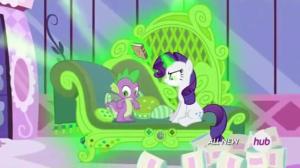
Number Nine: "Inspiration Manifestation" (Season Four, Episode Twenty-Three)
Imagine a magic spell that could bring everything you ever wished to life. Everything you ever want to create, your hopes and dreams met with just a thought. Would you be consumed by this spell? Would all your generosity to help others turn into a lust to perfect everything in your own image?
This is what makes "Inspiration Manifestation" so great, as Spike finds a spell book to help out a stressed, overworked and under-appreciated Rarity. It is something so very rarely seen on this show, in a world full of magic, both good and bad, there is a spell that can be taken as a good thing, but can corrupt the user. But the strange thing is that, even as Rarity descends into madness, she still feels like she’s doing the right thing. Being the element of generosity, Rarity puts others and their well beings above herself, so the interest of others is in her mind. So if that means replacing all of their chariots with "Rar-iots" because these ones are better, then so be it.
Of course, this is an episode that focuses primarily on the relationship between Rarity and Spike, who has always had a crush on Rarity but has never reciprocated those feelings. Spike, in a desperate attempt to keep Rarity happy, agrees with everything she says even if the spell is beginning to take her over. But once he puts his foot down and steps up for himself, telling her that what she is doing her is wrong, the real Rarity comes back. A good lesson for anyone who has ever had a crush on someone else - they’re not perfect, so don’t treat them like they’re royalty.

Number Eight: "Do Princesses Dream Of Magic Sheep?" (Season Five, Episode Thirteen)
MLP seems to follow the "Mystery Science Theater 3000" style of comedy - These jokes are made, not for everyone, but for the right people. And this title, for those that get it, will find it hilarious.
One of the more mysterious and tragic characters in MLP is Princess Luna, the magical pony that controls the moon and the night. Her sister, Princess Celestia, controls the sun and day, and is often beloved by all of Equestria for providing life and happiness, while Luna’s work is overlooked. After years of being treated badly, Luna fought back and became the terrible Nightmare Moon, threatening to plunge Equestria into eternal night. But Celestia used her powers and the Elements of Harmony to trap Luna in the moon for a thousand years. After that time expired and the new Elements of Harmony forced the evil out of Luna, she returned to her princess duties and a protector of the night.
But not without punishing herself.
We find out in this episode that Luna put a spell on herself and created a nightmare creature that feeds off of her bad dreams. Now she has the same dream every night, of our main characters destroying Nightmare Moon, so that Luna would never forgive herself for what she did as Nightmare Moon.
And now that creature, called the Tantabus, has escaped from her dreams and is finding new ponies to unleash their worst nightmares on.
This the episode that best explores the character of Princess Luna, as a tortured soul who is filled with nothing but regrets and wants nothing more than to forget past, but is unable to.
Combine that with an imaginative story of exploring every main characters dreams, including Rainbow Dash fighting off Changelings, Twilight being in a never-ending library and Applejack with an apple that is ten times her size, and one of the biggest nods to previous episodes in the entire show in the final confrontation with the Tantabus, and you have a wonderfully beautiful and entrancing episode.
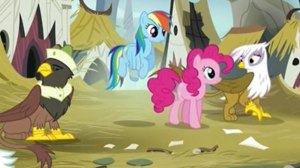
Number Seven: "The Lost Treasure Of Griffonstone" (Season Five, Episode Eight)
If there’s a theme throughout season five of MLP, it is redemption.
One thing that MLP has always done in the past is to convert old enemies into new friends, like the malevolent Discord and the phony "Great and Powerful" Trixie. Because locking up the bad and evil characters isn’t going to solve anything, and often times they’re misunderstood rather than evil. Especially in the case of our returning "villain" in this episode - Gilda the griffon.
Early in season one, Gilda was cast out of Ponyville by her former friend, Rainbow Dash, after she was an ungrateful and unpleasant bully to Pinkie Pie. Someone who was once seen as a one-dimensional villain is now shown to be a complex character that has been shunned her whole life for looking different, except by Rainbow Dash, her only true friend. Rather than despising her for what happened, Pinkie Pie welcomes Gilda with open hooves (or claws in Gilda’s case). And as Rainbow Dash reopens to her friend, so do we.
We are also given a history lesson about Griffons in the world of Equestria - a once proud race who lived together in harmony, until they were split apart by greed and selfishness. Which is what we see now - a once-mighty city on the verge of collapse, full of creatures that are too full of themselves to notice that everything they’ve stood for is falling apart.
This whole episode is one great reason why I love this show - Detailed world-building, heart-felt moments of kindness, and giving old characters new opportunities to become better characters due to quality writing. Throw in two of the best characters, Pinkie Pie and Rainbow Dash, going on an adventure through this city, and you get some of the best comedy and character moments of the season.
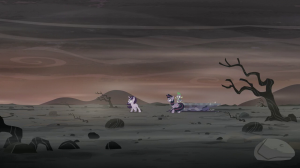
Number Six: "The Cutie Re-Mark" (Season Five, Episodes Twenty-Five and Twenty-Six)
The redemption train keeps on rolling.
Certainly the most complex new character to come out of season five was Starlight Glimmer. She was introduced in the first two-parter to open up the season, "The Cutie Map." Our cast of characters travel to a small town that she ran, where every pony had the same cutie mark. In Starlight’s words, this is her version of a utopia, where no pony is judged for being different and everyone is treated equally.
After her plans are thwarted and the town returns to normal, Starlight escapes into the mountains. Only to make her return here in the two-parter to end season five. Now she seeks revenge on Twilight for ruining her dream of a perfect world where other ponies would never be hurt by a cutie mark. Her plan of vengeance? To go back in time and prevent Rainbow Dash’s Sonic Rainboom that caused all of the main characters to get their cutie marks, thus separating their special bond.
What Starlight could never have predicted was what this event meant to the safety of Equestria. Twilight and Spike attempt to stop Starlight Glimmer, and fail every time, always returning to the "present," with each one getting progressively worst, as a former villain throughout the show succeeded in their plans to conquer Equestria. From Nightmare Moon unleashing eternal night, to King Sombra using the forces of the Crystal Empire to unleash a never-ending war, to the Changelings draining all the happiness out of ponies and forcing the survivors into the forest and always judging every newcomer that might be a Changeling.
This is, without a doubt, the darkest and most disturbing episode of MLP. We watch as Equestria falls apart, the lives we’ve witnessed over the past five seasons be destroyed by war, chaos and cruelty. In one timeline, Rainbow Dash has lost one wing and has it replaced with a metal one. While in another, Fluttershy, the element of kindness is ready to viciously kill Twilight because she might be a Changeling.
And all because Starlight wanted revenge on Twilight. Revenge, the most worthless of causes.
The second half of the second episode is dedicated to why Starlight would do all this and how she got to where she was. Twilight then realizes that she can’t beat Starlight. There’s no way she can stop Starlight from her plans and that the two could be at this for all eternity if they wanted to. But it would never solve Starlight’s problem - her inability to trust others and see that a cutie mark should be cherished, not mocked.
I won’t spoil how this one ends, since it could mean big things for the future of MLP. But let’s just say that, like when Twilight became a princess, this could have big implications for the next season.
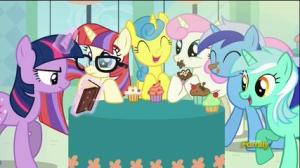
Number Five: "Amending Fences" (Season Five, Episode Twelve)
But the theme of redemption is not limited to minor characters. In this case, Twilight is the one seeking to redeem herself in her first full episode about the newly crowned princess since "Magic Duel."
Twilight, now dubbed the "Princess of Friendship," has a realization one day - Before the events of this show started, she was a terrible friend. She was always reading a book or studying, never paying attention to her friends from Canterlot. And when the show started, she ditched everything there to move to Ponyville, never saying goodbye to anyone. Now she wishes to make up for this by returning to her roots and making amends to her old friends. What she finds out is that most of her old friends never thought badly of her, that this was who she was and just enjoyed her company. That is except for one friend, Moondancer.
In a call-back to the first episode of MLP, which was more of a throwaway line at the time, we find out that Moondancer was having a party, something she never did since she was an even bigger bookworm than Twilight. But Twilight, her best friend, couldn’t make it because she had "lots of studying to do."
And now Moodancer does nothing but studying for the sake of studying. Her journeys take to the library and back to her rundown cottage in the woods, far away from every pony. She has given up on socializing, because she knows that it will only end in misery when they have to leave or become too important for you.
This is a great example of how the writing on MLP is improving, giving us glances at these characters that make us question if they’re doing the right thing, while still being accessible for children. An episode like this would have been impossible in season two or three, but we see Twilight has a character who has made mistakes and wants nothing more than to make up for it.
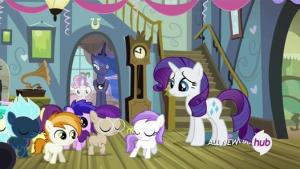
Number Four: "For Whom the Sweetie Belle Toils" (Season Four, Episode Nineteen)
I mentioned in "Do Princesses Dream of Magic Sheep?" that Princess Luna is in control of the night, but she also has the ability to enter other ponies dreams and talk to them through their visions. We saw Luna do this with each of the Cutie Mark Crusaders, first with Scootaloo in "Sleepless in Ponyville" back in season three, and early on in season five with Apple Bloom in "Bloom and Gloom." This is Sweetie Belle’s turn and it is the best of the trilogy.
With "Sleepless in Ponyville" and "Bloom and Gloom," those were dealing more with Scootaloo and Apple Bloom’s fears of being rejected by Rainbow Dash and what it would mean to get a cutie mark, respectively. This one delves, not into Sweetie Belle’s fears, but the fact that she always feels overshadowed by her sister, Rarity. When she makes an entire play, including the set and dialogue, all any pony could talk about afterwards was the customs, designed by Rarity. Even when she tries to do what she loves, it is always about Rarity.
What follows is a "Christmas Carol"-like story, as we see the past, present and future of the relationship between Sweetie Belle and Rarity through dreams, while Luna puts a new perspective on what Sweetie Belle sees of her older sister. That when she made a fool of herself at her fifth-birthday party, Rarity was the one to turn the party around by making every kid happy, or that Rarity spent endless nights getting the costumes for the play ready, pushing aside all her other projects to do so.
This takes the amazingly creative dreamscape of the previous episodes and gives it a touching character piece about two sisters who now see more than just themselves in each other.

Number Three: "Crusaders of the Lost Mark" (Season Five, Episode Eighteen)
Yeah, yeah, stupid pun title. I know, but the importance and execution of this episode cannot be denied.
There’s no other way around it. This episode makes the list for a good reason - The Cutie Mark Crusaders finally get their cutie marks. And it was done so well.
For five seasons, this moment has been building up. Apple Bloom, Sweetie Belle and Scootaloo’s adventure began in early season one, when they found each other and decided to try to find something they were all good at and find their cutie marks together. Since then, they’ve strayed far from getting into dangerous situations to get their marks and instead found out more about themselves, like the previously mentioned "For Whom the Sweetie Belle Toils." They also learned what it means to have a cutie mark that it is not just a sign of maturity but that you have found your place in the world.
Now it all comes together perfectly, as we have one last tale of redemption with the one character every fan thought was unredeemable - the bully of the Cutie Mark Crusaders, Diamond Tiara.
For as long as the Crusaders have gone on their escapades, Diamond Tiara has been there to scoff at them, always calling them "blank flanks" and getting every kid in the school to laugh at them. As it turns out, her cutie mark allows her to persuade others into doing her bidding, which she has always used for her selfish and greedy purposes. She is, in every sense of the word, a bully. Until this episode, and we learn about how her parents don’t see her as their daughter, but as a way to climb the social latter faster.
Diamond Tiara has been misled and confused her entire life that she needs to block out anyone less than her and treat them as filth. When she learns what the Crusaders do outside of school, she says they are very lucky to be able to explore and learn about themselves. Diamond Tiara had this lifestyle thrust upon her and didn’t know any other way to take out her anger and confusion on the world.
The moment the Crusaders realize that Diamond Tiara has potential to help others, rather than hurt them, they help her realize her potential and what her mark truly means. They not only earn a new friend, but get their marks as well. They have found their calling - To help other ponies earn their cutie marks and help them realize what their marks mean.
The crusade comes to an end, but begins all over again.

Number Two: "Brotherhooves Social" (Season Five, Episode Seventeen)
And now we reach a new type of story for the final two episodes: Minor character theater.
If there’s one thing I loved above all else in season five, it was the world and character building. Not just what was done with the main characters, especially the Cutie Mark Crusaders, but the characters that normally don’t get the spotlight. It comes across like the show’s creators are aware of how popular this show as become, and that many fans’ favorite characters are not the main ones. Sometimes they’re background characters, ones who have never said a word or have less than a few seconds of screen time per episode, yet they pack so much character into those few seconds.
"Brotherhooves Social" is one of best examples of that, as the only main character in this episode is Applejack, for about two minutes. The focus of this episode is Applejack and Apple Bloom’s big brother - Big Macintosh, or Big Mac for short. A character that is known for his unbelievable strength, and his limited vocabulary of "E’yup!" and "Nope!" He is shown to have an impressive vocabulary and has even joined a barbershop quartet in one episode, but he chooses to stay with those two words most of the time.
In this episode, Applejack and Apple Bloom are excited for the upcoming Sisterhooves Social event, which they dominate every year. But when Applejack is called away due to a problem in Manehattan, Apple Bloom is crushed. So, Big Mac, in an attempt to please his baby sister, dresses up in drag, going by the name Orchard Blossom, so that he and Apple Bloom can compete in the event.
This is one of the funniest episodes of MLP, because of how different Big Mac and Orchard Blossom are. Orchard has a massive southern vocabulary, taking every opportunity to use the most fancy words imaginable. Orchard is extremely social and wants to get to know every pony, while Big Mac is content to himself and only talks to others if it is absolutely necessary.
And of course, no pony buys the disguise, they all know it is Big Mac dressed as a woman.
The final event of the social really highlights the comedy, as Big Mac desperately tries to win one event for Apple Bloom, and his strength breaks the entire course. The sight of an angry Big Mac in drag running right at Rainbow Dash is a sight that needs to be seen.
But what makes this episode stick with me is the ending, where Big Mac opens up to Apple Bloom. We learn that, even though he may not say much, doesn’t mean he isn’t feeling anything. That he feels like he’s being left behind, Applejack has a big role in Equestria and he stays on the farm doing his job. And yet, all Apple Bloom ever seems to talk about is Applejack. He can live with being on the farm all day, but it upsets him that his sister thinks so little of him.
"Brotherhooves Social" is a wonderful character building episode, with a touching ending, great comedy throughout and character building on someone that deserves more attention.
And the Number One best new episode of "My Little Pony: Friendship Is Magic" is (Say it with me, pony fans)...

"Slice Of Life" (Season Five, Episode Nine)
This was the episode that fans have been waiting years to witness - a celebration of everything that is wonderful about MLP.
"Slice Of Life" is the 100th episode of MLP, a massively impressive achievement no matter what your show is about, and the creators of MLP have dedicated this one to the bronies and pegasisters, because they know this show would never have lasted five seasons and over 100 episodes without their support. So the creators give us a love letter to everything that fans have been asking for, to the background characters.
Outside of the final line of the episode, none of the main characters say anything or are featured here. This is an episode entirely about the characters who never have had an opportunity to shine and their "normal" lives in Ponyville. From the fan-favorite cross-eyed and clumsy Derpy, to the completely self-aware and hilarious Doctor Whooves (yes, they make every possible joke they can about that), to the "Lebowski" ponies that look and behave exactly like their counterparts in "The Big Lebowski," to the odd-yet-captivating relationship between DJ-PON3 and Octavia, one pony that is obsessed with modern techno beats and another that masters in classical cello music and share a house together.
Every major character that fans have speculated for years is given an opportunity to shine in this episode, as the town prepares for a wedding while our normal cast of characters are off fighting a monster. Derpy is as dim-witted as she is kind, the Doctor is obssessed with science and technology (what little there is in this world) while making as many "Doctor Who" references as possible, and the two musical ponies compliment each other nicely as they support each other in their endeavors to make better art.
But my favorite in this episode, by the slimmest of margins, is Lyra and Bon Bon. These two do everything together (In "Do Princesses Dream of Magic Sheep?," there is one scene where we see their dreams, and they have joined into one creature, similar to Nickelodeon's "Cat-Dog"). But when Bon Bon finds out about this monster the main characters are fighting, called a Bug-Bear, her cover is blown and her secrets have been revealed.
I won't go into too much detail, but let's just say there is often confusion about Bon Bon, especially in marketing and toys for MLP. Sometimes she's Bon Bon, other times she's Sweetie Drop, and every time she's spoken on the show she has had a different voice actress. The way it is handled in this episode is unforgettable.
And that's how I would describe "Slice Of Life" - unforgettable. Every scene is packed with references and jokes, each character is wholely unique and it wonderful to see a new perspective on MLP that has never been explored before. This episode gives us exactly what the fans wanted out of a tribute episode and I loved every second of it.





